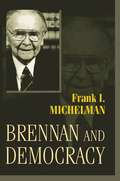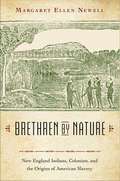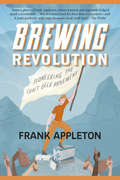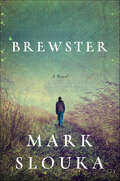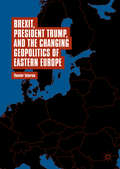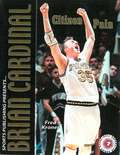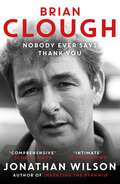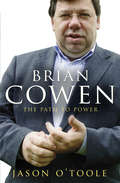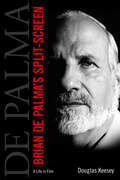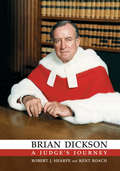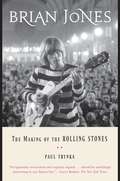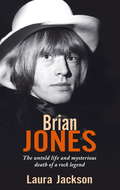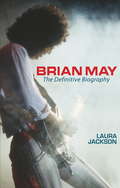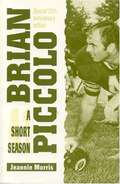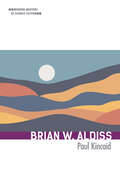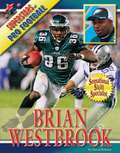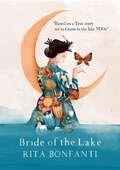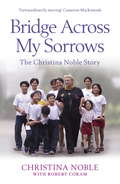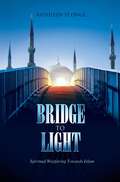- Table View
- List View
Brennan and Democracy
by Frank I. MichelmanIn Brennan and Democracy, a leading thinker in U.S. constitutional law offers some powerful reflections on the idea of "constitutional democracy," a concept in which many have seen the makings of paradox. Here Frank Michelman explores the apparently conflicting commitments of a democratic governmental system where key aspects of such important social issues as affirmative action, campaign finance reform, and abortion rights are settled not by a legislative vote but by the decisions of unelected judges. Can we--or should we--embrace the values of democracy together with constitutionalism, judicial supervision, and the rule of law? To answer this question, Michelman calls into service the judicial career of Supreme Court Justice William Brennan, the country's model "activist" judge for the past forty years. Michelman draws on Brennan's record and writings to suggest how the Justice himself might have understood the judiciary's role in the simultaneous promotion of both democratic and constitutional government. The first chapter prompts us to reflect on how tough and delicate an act it is for the members of a society to attempt living together as a people devoted to self-government. The second chapter seeks to renew our appreciation for democratic liberal political ideals, and includes an extensive treatment of Brennan's judicial opinions, which places them in relation to opposing communitarian and libertarian positions. Michelman also draws on the views of two other prominent constitutional theorists, Robert Post and Ronald Dworkin, to build a provocative discussion of whether democracy is best conceived as a "procedural" or a "substantive" ideal.
Brethren by Nature
by Margaret Ellen NewellIn Brethren by Nature, Margaret Ellen Newell reveals a little-known aspect of American history: English colonists in New England enslaved thousands of Indians. Massachusetts became the first English colony to legalize slavery in 1641, and the colonists' desire for slaves shaped the major New England Indian wars, including the Pequot War of 1637, King Philip's War of 1675 76, and the northeastern Wabanaki conflicts of 1676 1749. When the wartime conquest of Indians ceased, New Englanders turned to the courts to get control of their labor, or imported Indians from Florida and the Carolinas, or simply claimed free Indians as slaves. Drawing on letters, diaries, newspapers, and court records, Newell recovers the slaves' own stories and shows how they influenced New England society in crucial ways. Indians lived in English homes, raised English children, and manned colonial armies, farms, and fleets, exposing their captors to Native religion, foods, and technology. Some achieved freedom and power in this new colonial culture, but others experienced violence, surveillance, and family separations. Newell also explains how slavery linked the fate of Africans and Indians. The trade in Indian captives connected New England to Caribbean and Atlantic slave economies. Indians labored on sugar plantations in Jamaica, tended fields in the Azores, and rowed English naval galleys in Tangier. Indian slaves outnumbered Africans within New England before 1700, but the balance soon shifted. Fearful of the growing African population, local governments stripped Indian and African servants and slaves of legal rights and personal freedoms. Nevertheless, because Indians remained a significant part of the slave population, the New England colonies did not adopt all of the rigid racial laws typical of slave societies in Virginia and Barbados. Newell finds that second- and third-generation Indian slaves fought their enslavement and claimed citizenship in cases that had implications for all enslaved peoples in eighteenth-century America. "
Brewing Revolution: Pioneering the Craft Beer Movement
by Frank AppletonThe inspiring story behind today's craft beer revolution is the subject of this lively memoir by Frank Appleton, the English-trained brewmaster who is considered by many to be the father of Canada's craft-brewing movement. Appleton chronicles fifty years in the brewing business, from his early years working for one of the major breweries, to his part in establishing the first cottage brewery in Canada, to a forward look at the craft-beer industry in an ever more competitive market.Disillusioned with the Canadian brewing scene in the early 1970s, when three huge companies controlled 90 percent of the market and marketers and accountants made the decisions on what products to make, not the brewmasters, Appleton decided to "drop out" and brew his own beer while homesteading in the interior of British Columbia. He made a meagre living as a freelance writer, and his article entitled "The Underground Brewmaster" sparked the interest of John Mitchell, co-founder of the Troller Pub in Horseshoe Bay, BC. Their partnership launched the Horseshoe Bay Brewery in June 1982, the first of its kind in the country, serving the iconic Bay Ale brewed from Appleton's recipe.Covering a range of topics, such as the difficulty of steering beer drinkers away from the "Big Boys" breweries and struggles with the BC Liquor Control Board, as well as brewing plant design and the complexities of the malting process, Brewing Revolution touches upon the foundation of what shaped the craft-beer industry in Canada. Appleton's passion and innovation opened the gates for the scores of brewpubs and microbreweries that were to follow in both Canada and the US, and his story is of interest to anyone excited by today's craft-beer revival.
Brewster: A Novel
by Mark Slouka"Intense and elegiac…devastatingly agile." —New York Times Book ReviewThe year is 1968. The world is changing, and sixteen-year-old Jon Mosher is determined to change with it. Racked by guilt over his older brother’s childhood death and stuck in the dead-end town of Brewster, New York, he turns his rage into victories running track. Meanwhile, Ray Cappicciano, a rebel as gifted with his fists as Jon is with his feet, is trying to take care of his baby brother while staying out of the way of his abusive, ex-cop father. When Jon and Ray form a tight friendship, they find in each other everything they lack at home, but it’s not until Ray falls in love with beautiful, headstrong Karen Dorsey that the three friends begin to dream of breaking away from Brewster for good. Freedom, however, has its price. As forces beyond their control begin to bear down on them, Jon sets off on the race of his life—a race to redeem his past and save them all.Mark Slouka's work has been called "relentlessly observant, miraculously expressive" (New York Times Book Review). Reverberating with compassion, heartache, and grace, Brewster is an unforgettable coming-of-age story from one of our most compelling novelists.A New York Times Book Review Editor’s Choice A Washington Post Notable Book of 2013 A Barron’s Favorite Book of the Year, selected by Daniel Woodrell A Booklist Best Adult Books for Young Adults Editor’s Choice 2013
Brexit, President Trump, and the Changing Geopolitics of Eastern Europe
by Theodor TudoroiuThis book analyzes the combined consequences of Brexit and of the new US foreign policy under President Trump on the geopolitical situation of Eastern Europe. It perceives the evolution of the East European regional security complex as a struggle between the European Union's Kantian, win-win geopolitical vision and Russia's neoclassical geopolitics, also promoted by President Trump. In the most probable scenario, the latter approach will have the upper hand. The EU's post-Brexit control by the Franco-German axis will likely be followed by the geopolitical irrelevance of the EU due to the renationalization of member states' foreign policy, with Germany becoming the main West European actor. Consequently, Eastern Europe will be turned into the arena of a mainly three-cornered neoclassical geopolitics rivalry opposing Russia, the Franco-German axis and then Germany, and the US in alliance with the post-Brexit UK and certain East European states. The book will appeal to scholars across the fields of International Relations, Geopolitics, European Studies, and Area Studies.
Brian Cardinal: Citizen Pain (Basketball Superstar Ser.)
by Fred KronerBefore he became a fan favorite in West Lafayette, Ind., before there was a contest to give him a nick-name, Brian Cardinal questioned whether he could make the transition to big-time collegiate basketball from a small-town community of 2,600. The Tolono, Ill., native's success, Cardinal now ranks among Purdue's all-time leaders, is a testament to his unrelenting work ethic and intensity and should be an inspiration to those who have heard a parent say, "Work hard and you can be whatever you want."
Brian Clough: The Biography
by Jonathan WilsonThe final word on Brian CloughIn this first full, critical biography, Jonathan Wilson draws an intimate and powerful portrait of one of England's greatest football managers, Brian Clough, and his right-hand man, Peter Taylor. It was in the unforgiving world of post-war football where their identities and reputations were made - a world where, as Clough and Taylor's mentor Harry Storer once said, 'Nobody ever says thank you.'Nonetheless, Clough brought the gleam of silverware to the depressed East Midlands of the 1970s. Initial triumph at Derby was followed by a sudden departure and a traumatic 44 days at Leeds. By the end of a frazzled 1974, Clough was set up for life financially, but also hardened to the realities of football. By the time he was at Forest, Clough's mask was almost permanently donned: a persona based on brashness and conflict. Drink fuelled the controversies and the colourful character; it heightened the razor-sharp wit and was a salve for the highs of football that never lasted long enough, and for the lows that inevitably followed. Wilson's account is the definitive portrait of this complex and enduring man.
Brian Clough: The Biography
by Jonathan WilsonThe final word on Brian CloughIn this first full, critical biography, Jonathan Wilson draws an intimate and powerful portrait of one of England's greatest football managers, Brian Clough, and his right-hand man, Peter Taylor. It was in the unforgiving world of post-war football where their identities and reputations were made - a world where, as Clough and Taylor's mentor Harry Storer once said, 'Nobody ever says thank you.'Nonetheless, Clough brought the gleam of silverware to the depressed East Midlands of the 1970s. Initial triumph at Derby was followed by a sudden departure and a traumatic 44 days at Leeds. By the end of a frazzled 1974, Clough was set up for life financially, but also hardened to the realities of football. By the time he was at Forest, Clough's mask was almost permanently donned: a persona based on brashness and conflict. Drink fuelled the controversies and the colourful character; it heightened the razor-sharp wit and was a salve for the highs of football that never lasted long enough, and for the lows that inevitably followed. Wilson's account is the definitive portrait of this complex and enduring man.
Brian Cowen: The Path to Power
by Jason O'TooleMeet Ireland's new Taoiseach, Brian CowenDespite a high profile at the centre of Irish political life for more than twenty years, relatively little is known about our new leader. Just who is Brian Cowen?The story begins in the village of Clara, Co. Offaly, where family, local life and the GAA were formative influences. The sudden and unexpected death of his father, Ber Cowen, Fianna Fáil TD for Laois Offaly, thrust a twenty-four year-old Cowen into the heart of Irish politics. After an eight-year apprenticeship on the back benches, Cowen was appointed to his first ministerial position by Albert Reynolds and later went on to hold the senior cabinet positions of Health, Foreign Affairs and Finance. By the time of Bertie Ahern's resignation, Cowen's standing in the party was such that his election to the leadership of Fianna Fáil seemed inevitable. On 7 May 2008, Brian Cowen became Ireland's eleventh Taoiseach. Here, for the first time, is a portrait of Brian Cowen which follows his remarkable life story, tracing the road to power from early childhood right up to his eventful early months in the office of An Taoiseach.
Brian De Palma's Split-Screen: A Life in Film
by Douglas KeeseyOver the last five decades, the films of director Brian De Palma (b. 1940) have been among the biggest successes (The Untouchables; Mission: Impossible) and the most high-profile failures (The Bonfire of the Vanities) in Hollywood history. De Palma helped launch the careers of such prominent actors as Robert De Niro, John Travolta, and Sissy Spacek (who was nominated for an Academy Award as Best Actress in Carrie). Indeed, Quentin Tarantino named Blow Out as one of his top three favorite films, praising De Palma as the best living American director. Picketed by feminists protesting its depictions of violence against women, Dressed to Kill helped to create the erotic thriller genre. Scarface, with its over-the-top performance by Al Pacino, remains a cult favorite. In the twenty-first century, De Palma has continued to experiment, incorporating elements from videogames (Femme Fatale), tabloid journalism (The Black Dahlia), YouTube, and Skype (Redacted and Passion) into his latest works. What makes De Palma such a maverick even when he is making Hollywood genre films? Why do his movies often feature megalomaniacs and failed heroes? Is he merely a misogynist and an imitator of Alfred Hitchcock? To answer these questions, author Douglas Keesey takes a biographical approach to De Palma's cinema, showing how De Palma reworks events from his own life into his films. Written in an accessible style and including a chapter on every one of his films to date, this book is for anyone who wants to know more about De Palma's controversial films or who wants to better understand the man who made them.
Brian Dickson
by Kent Roach Robert J. SharpeWhen Brian Dickson was appointed in 1973, the Supreme Court of Canada was preoccupied with run-of-the-mill disputes. By the time he retired as Chief Justice of Canada in 1990, the Court had become a major national institution, very much in the public eye. The Court's decisions, reforming large areas of private and public law under the Charter of Rights, were the subject of intense public interest and concern.Brian Dickson played a leading role in this transformation. Engaging and incisive, Brian Dickson: A Judge's Journey traces Dickson's life from a Depression-era boyhood in Saskatchewan, to the battlefields of Normandy, the boardrooms of corporate Canada and high judicial office, and provides an inside look at the work of the Supreme Court during its most crucial period. Dickson's journey was an important part of the evolution of the Canadian judiciary and of Canada itself. Sharpe and Roach have written an accessible biography of one of Canada's greatest legal figures that provides new insights into the work of Canada's highest court.
Brian Jones
by Paul TrynkaFor the first time, the complete story of the enigmatic founder of the Rolling Stones and the early years of the band Brian Jones was the golden boy of the Rolling Stones--the visionary who gave the band its name and its sound. Yet he was a haunted man, and much of his brief time with the band, before his death in 1969 at the infamous age of twenty-seven, was volatile and tragic. Some of the details of how Jones was dethroned are well known, but the full story of his downfall is still largely untold. Brian Jones is a forensic, thrilling account of Jones's life, which for the first time details his pioneering achievements and messy unraveling. With more than 120 new interviews, Trynka offers countless new revelations and sets straight the tall tales that have long marred Jones's legacy. His story is a gripping battle between creativity and ambition, between self-sabotage and betrayal. It's all here: the girlfriends, the drugs, and some of the greatest music of all time. Victors get to write history--but it's rarely fully true. The complete, magnificent story of the Rolling Stones can never be told until we disentangle all the threads and put Brian Jones back in the foreground.
Brian Jones: The Untold Life and Mysterious Death of a Rock Legend
by Laura JacksonIn this definitive biography of Brian Jones, Laura Jackson - the first to insist that Jones was murdered and the first to identify his killer - rejects the stereotype of a narcissistic rock star who was doomed to self-destruct. Instead, she spoke to the people who knew him best: his family and friends, girlfriends and confidantes, the musicians and friends who lived and worked with him right up until his death in 1969. Jones emerges as a man of immense talent, energy and humour, but crippled by insecurities and shyness - a portrayal greatly at odds with the sordid rumours that plagued him throughout his life, which continue to this day. Jackson provides new testimony on the rivalries within the Rolling Stones and the bitter final split, together with telling details from the pathology and coroner's reports, to tell the story behind the headlines and get to the heart of the mysterious death of Brian Jones.
Brian Jones: The untold life and mysterious death of a rock legend
by Laura JacksonIn this definitive biography of Brian Jones, Laura Jackson - the first to insist that Jones was murdered and the first to identify his killer - rejects the stereotype of a narcissistic rock star who was doomed to self-destruct. Instead, she spoke to the people who knew him best: his family and friends, girlfriends and confidantes, the musicians and friends who lived and worked with him right up until his death in 1969. Jones emerges as a man of immense talent, energy and humour, but crippled by insecurities and shyness - a portrayal greatly at odds with the sordid rumours that plagued him throughout his life, which continue to this day. Jackson provides new testimony on the rivalries within the Rolling Stones and the bitter final split, together with telling details from the pathology and coroner's reports, to tell the story behind the headlines and get to the heart of the mysterious death of Brian Jones.
Brian May's Red Special: The Story of the Home-made Guitar that Rocked Queen and the World
by Brian May Simon BradleyIn Brian May's Red Special you will discover everything about Brian May's unique, home-made guitar. Brian reveals all, from the guitar's origins to playing on the roof of Buckingham Palace, from Live Aid to the closing ceremony of the London 2012 Olympics, from the set of Bohemian Rhapsody to opening the Academy Awards in 2019 where the film scooped four Oscars. All of this is accompanied by original diagrams, sketches and notes from the building of the guitar, as well as a selection of classic photographs including Brian on stage with his guitar, close-ups and even an X-ray. Rare images are included throughout, as the entire guitar was dismantled and photographed for the book.
Brian May's Red Special: The Story of the Home-made Guitar that Rocked Queen and the World
by Brian May Simon BradleyIn Brian May's Red Special you will discover everything about Brian May's unique, home-made guitar. Brian reveals all, from the guitar's origins to playing on the roof of Buckingham Palace, from Live Aid to the closing ceremony of the London 2012 Olympics, from the set of Bohemian Rhapsody to opening the Academy Awards in 2019 where the film scooped four Oscars. All of this is accompanied by original diagrams, sketches and notes from the building of the guitar, as well as a selection of classic photographs including Brian on stage with his guitar, close-ups and even an X-ray. Rare images are included throughout, as the entire guitar was dismantled and photographed for the book.
Brian May: The Definitive Biography
by Laura JacksonAs the lead guitarist of Queen, Brian May is one of rock's most recognisable stars. Brian May: the definitive biography charts his life from his childhood, through his years studying astro physics and teaching, his success with Queen, his more recent projects and his volatile relationship with actress Anita Dobson. Bestselling writer Laura Jackson examines closely the many aspects of the musician's life revealing his true story for the first time. The book reveal's Queen's struggles to gain success and life at the top, throwing some of the most notorious and wildly salacious parties in the business. It charts the camaraderie and conflicts within Queen as well as Brian's difficult years throughout the disintegration of his first marriage, the death of his father and the profound professional and emotional effects of Freddie Mercury's illness and death. The book is packed with nearly 70 first-hand exclusive interviews with some of his closest friends, colleagues and fellow musicians. These include school and college friends, early band members and colleagues in the scientific world. Interviewees include, Tony Iommi, Joe Elliott, Raul Rodgers, Cliff Richard and Spike Edney.
Brian May: The definitive biography
by Laura JacksonAs the lead guitarist of Queen, Brian May is one of rock's most recognisable stars. Brian May: The Definitive Biography charts his life from his childhood, through his years studying astrophysics and teaching, to his success with Queen, his more recent projects and his volatile relationship with actress Anita Dobson. Bestselling writer Laura Jackson examines closely the many aspects of the May's life, detailing Queen's struggles to acheive success and what life at the top was really like. It charts the camaraderie and conflicts within Queen as well as the disintegration of May's first marriage, the death of his father and the profound professional and emotional effects of Freddie Mercury's illness and death. Packed with nearly seventy first-hand exclusive interviews with some of May's closest friends, colleagues and fellow musicians - including Iommi, Joe Elliott, Raul Rodgers, Cliff Richard and Spike Edney - this is an extraordinary, inimate portrait of a rock legend.
Brian Piccolo: A Short Season
by Jeannie MorrisThe moving story of the hero of "Brian's Song." Chicago Bear running back Brian Piccolo died of cancer on June 16, 1970 at the age of 26. He left behind a young wife, three daughters, a host of friends--and a legend. Shortly after his death, Joy Piccolo, Brian's wife called her close friend and said, "Jeannie, would you finish Brian's book?" This is his story, a classic sports biography.
Brian W. Aldiss (Modern Masters of Science Fiction)
by Paul KincaidBrian W. Aldiss wrote classic science fiction novels like Report on Probability A and Hothouse. Billion Year Spree, his groundbreaking study of the field, defined the very meaning of SF and delineated its history. Yet Aldiss’s discomfort with being a guiding spirit of the British New Wave and his pursuit of mainstream success characterized a lifelong ambivalence toward the genre. Paul Kincaid explores the many contradictions that underlay the distinctive qualities of Aldiss’s writing. Wartime experiences in Asia and the alienation that arose upon his return to the cold austerity of postwar Britain inspired themes and imagery that Aldiss drew upon throughout his career. He wrote of prolific nature overwhelming humanity, believed war was madness even though it provided him with the happiest period of his life, and found parallels in the static lives of Indian peasants and hidebound English society. As Kincaid shows, contradictions created tensions that fueled the metaphorical underpinnings of Aldiss's work and shaped not only his long career but the evolution of postwar British science fiction.
Brian Westbrook (Superstars of Pro Football)
by David RobsonA well illustrated book about Brian Westbrook--an NFL football player.
Bride of the Lake: Based on a true story set in Como in the late ‘800s
by Rita BonfantiIt is the dawn of May 3rd, 1891, in Como. In a house of Paradisett, a small district by the Lake, Cecilia had just woken up and was beside herself with joy. After years of conflicts with her father Zaverio, she finally sees a ray of light in her future. Alessandro, a young man from Umbria she is deeply in love with, is the subject of dispute: he is not a weaver, therefore not the son-in-law the man was dreaming to have. In fact, he is a simple office worker with a low income. A "scribbler". And on top of that, a "foreigner". Despite the hurdles, with determination and a clever plan, Cecilia manages to obtain what she wants, and that year, on Ferragosto, she marries her soulmate. The lake, a key element of the area's lifestyle, will profoundly impact Cecilia's existence on the very day of her wedding and, eleven years later, will be the creator of her destiny again. The novel is inspired by the life of Cecilia Gioconda Teodolinda Rossi, the author's grandmother.
Bridge Across My Sorrows: The Christina Noble Story
by Christina NobleChristina Noble's story is one of bravery and resilience in the face of deprivation and abuse on a scale that most would find unimaginable. Her childhood in the Dublin slums barely merits the name: after the early death of her mother, her family was split apart, her alcoholic father unable to care for his children. Christina was sexually abused and later escaped from an orphanage to live in poverty on the streets of Dublin. Whilst in an abusive marriage, in a dream she found the will to fight. Christina's hope lay in a determination to work among the street children of Vietnam, and this was the starting point for the most extraordinary part of her story. Within two years of arriving in Ho Chi Minh City she had opened a medical and social centre and achieved worldwide fame. Outspoken, often angry, yet profoundly moving, Bridge Across my Sorrows is one of the most inspirational stories ever told.
Bridge Over Troubled Dreams
by Delta GoodremThe emotional stories behind Delta Goodrem&’s sixth studio album. This eBook features an exclusive bonus chapter about the song Power from the Bridge Over Troubled Dreams album. In her first-ever book, Australian singer-songwriter Delta Goodrem shares the intimate stories behind each of the tracks on her sixth studio album, Bridge Over Troubled Dreams, taking readers on a deep dive into her inspiration for each song and revealing the truth behind the lyrics. From the touching account of her birth – two months premature – to battling bouts of missing home and many incredible self-discoveries along the way, Bridge Over Troubled Dreams is truly the book of the artist&’s life. She speaks candidly about love, family, highs and lows, patience, freedom, faith, hope and survival, and how she uses lessons learned to drive herself forward. Delta&’s heartfelt stories are accompanied by never-before-seen pictures from her personal collection: candid behind-the-scenes shots, unreleased tour photos and even personal snaps from her childhood.
Bridge To Light
by Kathleen OngeAddressed to Muslims in western societies and to non-Muslims interested in learning about the religion, this portrait of contemporary Islam uses simple terms to show how Islam crosses boundaries of language and culture. Arguing that it has relevant answers for problems in industrial societies, the book describes the moral code of the Qur''an as humane and rational and emphasizes the historical bridges that connect Islam to Judaism and Christianity. For practicing Muslims, the book advises on how best to navigate western culture without compromising traditional values.
